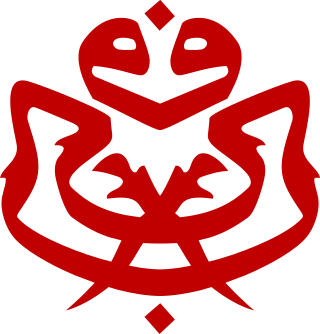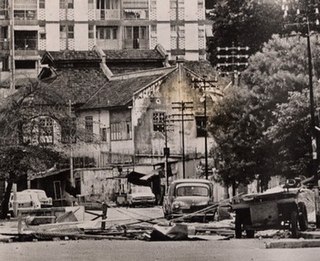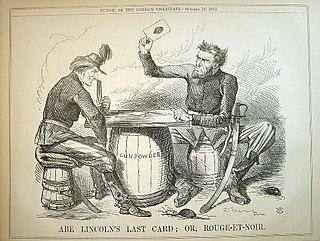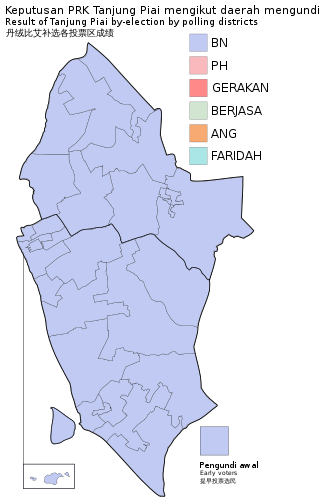Politics of Malaysia takes place in the framework of a federal representative democratic constitutional monarchy, in which the Yang di-Pertuan Agong is head of state and the Prime Minister of Malaysia is the head of government. Executive power is exercised by the federal government and the 13 state governments. Legislative power is vested in the federal parliament and the 13 state assemblies. The judiciary is independent of the executive and the legislature, though the executive maintains a certain level of influence in the appointment of judges to the courts.

The National Front is a political coalition of Malaysia that was founded in 1973 as a coalition of centre-right and right-wing political parties to succeed the Alliance Party. It is the third largest political coalition with 30 seats in the Dewan Rakyat after Pakatan Harapan (PH) with 82 seats and Perikatan Nasional (PN) with 74 seats.

The United Malays National Organisation ; abbreviated UMNO or less commonly PEKEMBAR, is a nationalist right-wing political party in Malaysia. As the oldest national political party within Malaysia, UMNO has been known as Malaysia's "Grand Old Party".

The 13 May incident was an episode of Sino-Malay sectarian violence that took place in Kuala Lumpur, the capital of Malaysia, on 13 May 1969. The riot occurred in the aftermath of the 1969 Malaysian general election when opposition parties such as the Democratic Action Party and Gerakan made gains at the expense of the ruling coalition, the Alliance Party.
The New Economic Policy (NEP) was a social re-engineering and affirmative action program formulated by the National Operations Council (NOC) in the aftermath of 13 May Incident in Malaysia. This policy was adopted in 1971 for a period of 20 years and it was succeeded by the National Development Policy (NDP) in 1991. This article looks into the historical context that gave rise to the formulation of this policy, its objectives and implementation methods as well as its impact on the Malaysian economy in general.

Playing the race card is an idiomatic phrase that refers to the exploitation by someone of either racist or anti-racist attitudes in the audience in order to gain an advantage. It constitutes an accusation of bad faith directed at the person or persons raising concerns as regards racism.

Khairy Jamaluddin Abu Bakar often referred to by his initials KJ, is a Malaysian politician, radio presenter and podcaster. Alongside being a radio presenter for Hot FM, he hosts Keluar Sekejap with Shahril Hamdan, a podcast in which they discuss Malaysian politics and current affairs with a variety of guests. Khairy is also one of the Members of the Board and Youth Advisor at JDT, as well as a visiting senior fellow at the ISEAS-Yusof Ishak Institute. He most recently served as Minister of Health in the Barisan Nasional (BN) administration under former Prime Minister Ismail Sabri Yaakob from August 2021 to November 2022.

The 1964 race riots in Singapore involved a series of communal race-based civil disturbances between the Malays and Chinese in Singapore following its merger with Malaysia in 1963, and were considered to be the "worst and most prolonged in Singapore's postwar history". The term is also used to refer specifically to two riots on 21 July 1964 and 2 September 1964, particularly the former, during which 23 people died and 454 others suffered severe injuries.

BERJASA is a political party in Malaysia. The party is part of a Malay-Islam based coalition named "Gerakan Tanah Air".
Article 153 of the Constitution of Malaysia grants the Yang di-Pertuan Agong responsibility for "safeguard[ing] the special position of the 'Malays' and natives of any of the States of Sabah and Sarawak and the legitimate interests of other communities" and goes on to specify ways to do this, such as establishing quotas for entry into the civil service, public scholarships and public education.

Ketuanan Melayu is a political concept that emphasises Malay preeminence in present-day Malaysia. The Malays of Malaysia have claimed a special position and special rights owing to their longer history in the area and the fact that the present Malaysian state itself evolved from a Malay polity. The oldest political institution in Malaysia is the system of Malay rulers of the nine Malay states. The British colonial authorities transformed the system and turned it first into a system of indirect rule, then in 1948, using this culturally based institution, they incorporated the Malay monarchy into the blueprints for the independent Federation of Malaya.
The social contract in Malaysia is an artificial political construct first mooted in the 1980s, allegedly to justify the continuation of the discriminatory preferential policies for the majority Bumiputera at the expense of the non-Bumiputeras, most particularly the Chinese and the Indian citizens of the country. Generally describing the envisaged 20-year initial duration of the Malaysian New Economic Policy, proponents of the construct allege that it reflects an "understanding" arrived at – prior to Malaya's independence in 1957 – by the country's "founding fathers", which is an ill-defined term generally taken to encompass Tunku Abdul Rahman, Malaysia's first Prime Minister, as well as V. T. Sambanthan and Tan Cheng Lock, who were the key leaders of political parties representing the Malay, Indian and Chinese populations respectively in pre-independence Malaya.
Datuk Ahmad bin Ismail, is a Malaysian politician and a member of the United Malays National Organisation (UMNO), serving as the chief of UMNO's Bukit Bendera division in the state of Penang.
Tan Sri Noh bin Haji Omar is a Malaysian politician and lawyer who served as the Minister of Entrepreneur Development and Cooperative for second term in the Barisan Nasional (BN) administration under former Prime Minister Ismail Sabri Yaakob from September 2021 to the collapse of the BN administration in November 2022 and the first term in the BN administration under former Prime Minister Abdullah Ahmad Badawi from March 2008 to April 2009, Minister of Urban Wellbeing, Housing and Local Government from June 2016 to the collapse of the BN administration in May 2018, Chairman of the Perbadanan Usahawan Nasional Berhad (PUNB) from June 2020 to September 2021. He also served as the Member of Parliament (MP) for Tanjong Karang from April 1995 to November 2022. He was a member of the United Malays National Organisation (UMNO), a component party of the Barisan Nasional (BN) coalition. He was also the State Chairman of BN and UMNO of Selangor. He is also the father of Nurul Syazwani Noh, Member of the Selangor State Legislative Assembly (MLA) for Permatang.
Dato' Sri Dr. Wee Jeck Seng is a Malaysian politician who is the Chairman-designate of the Keretapi Tanah Melayu Berhad (KTMB) and the Member of Parliament (MP) for Tanjung Piai from March 2008 to May 2018 and again since November 2019. He served as the Deputy Minister of Plantation Industries and Commodities I for the second term in the Barisan Nasional (BN) administration under former Prime Minister Ismail Sabri Yaakob and former Minister Zuraida Kamaruddin from August 2021 to the collapse of the BN administration in November 2022 and the first term in the Perikatan Nasional (PN) administration under former Prime Minister Muhyiddin Yassin and former Minister Khairuddin Razali from March 2020 to the collapse of the PN administration in August 2021, Deputy Minister of Youth and Sports in the BN administration under former Prime Ministers Abdullah Ahmad Badawi and Najib Razak as well as former Ministers Ismail Sabri Yaakob and Ahmad Shabery Cheek from March 2008 to his defeat in the 2010 MCA leadership election in June 2010 and Member of the Johor State Legislative Assembly (MLA) for Pekan Nanas from March 2004 to March 2008 as well as Chairman of the Labuan Port Authority (LPA) from March 2017 to June 2018. He is a member and member of the Central Committee of the Malaysian Chinese Association (MCA), a component party of the BN coalition. He has also served as the Vice President of MCA since September 2023.

Pertubuhan Pribumi Perkasa, is a Malay supremacist non-governmental organisation (NGO) that was formed by Ibrahim Ali in the aftermath of the 2008 general election (GE12). This conservative, extreme-right, ethnic Malay organisation is led by its president Ibrahim Ali to influence the unity of Malaysian by refusing to accept any decoration of other ethnic group except Malay decoration. The group is reported to have a membership of 700,000.
Datuk Wira Dr. Mohamed Farid bin Md Rafik was a Malaysian politician who was Deputy Minister in the Prime Minister's Department in charge of national unity and social wellbeing in the Pakatan Harapan (PH) administration under former Prime Minister Mahathir Mohamad and former Minister Waytha Moorthy Ponnusamy from July 2018 and the Member of Parliament (MP) for Tanjung Piai from May 2018 to his death in September 2019. He was a member of the Malaysian United Indigenous Party (BERSATU), a former component party of the PH coalition.

The 2019 Tanjung Piai by-election was a by-election held on 16 November 2019 for the Dewan Rakyat seat of Tanjung Piai. It was called following the death of incumbent, Md Farid Md Rafik on 21 September 2019.
Dato' Haji Jefridin bin Haji Atan is a Malaysian politician who has served as Member of the Johor State Legislative Assembly (MLA) for Kukup since March 2022. He had served as a Senator from September 2020 to September 2023. He is a member and Division Chief of Tanjung Piai of the United Malays National Organisation (UMNO), a component party of the Barisan Nasional (BN) coalition.

Hizatul Isham bin Abdul Jalil or more commonly known as Isham Jalil, is a Malaysian politician who was a member of the United Malays National Organisation (UMNO), a component party of the Barisan Nasional (BN) coalition. He is a former Member of the UMNO Supreme Council from June 2022 to December 2023, and has previously served as the Information Chief of UMNO from November 2022 to March 2023.










